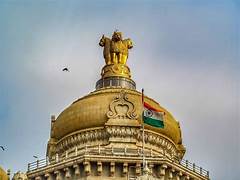Published on: May 26, 2023

Speaker of the Legislative Assembly
Speaker of the Legislative Assembly

Why in news? Five-time MLA and former Minister U.T. Khader, was unanimously elected as the Speaker of the Karnataka Legislative Assembly.
Highlights:
- Khader is the 23rd Speaker of the Legislative Assembly and the first Muslim to hold the post in Karnataka.
- He represents Mangaluru constituency, is also the second MLA to become the Speaker from Dakshina Kannada.
The Speaker of the Legislative Assembly
- He/she is the presiding authority and highest authority of state legislative assemblies for carrying house proceedings.
- Election: The Constitution of India provides that after every general election, the legislative assembly in a state at its very first session shall elect a speaker and a Deputy Speaker, from its among members.
- This post is held by two politicians for two identical roles such as “speaker” and “deputy speaker” for assembly session proceedings. In case one fails to attend the session due to some uncertainties such as resignation, illness or death, deputy speaker acts as a presiding officer until a new speaker is elected.
- It is created under the Article 178 of the Constitution of India.
- Tenure: The Speaker remains in office till the next Speaker is sworn in.
- Vacancy:
- If he resigns by writing to deputy speaker
- Removed from office by a resolution of the assembly.
- If he cease to be a member of the house
- If he dies.
- Removal: The removal of the speaker through a resolution of the Assembly requires 14 days’ notice when a motion for his removal is discussed the assembly, the speaker does not preside over the assembly.
- Speaker does not vacate his office on the dissolution of the Assembly.
- He continues to be the Speaker until immediately before the first sitting of the Assembly after the dissolution.
Powers and Function:
- The important function of the speakers is to preside over the sessions of the Legislative assembly and to maintain order and discipline within the house.
- The Speaker does not take part in the debate and usually does not vote except to break a tie.
- When assembly meets the speaker calls House to order maintains discipline in the house.
- He may adjourn the session or sitting of the House.
- He may suspend or expel members of the House for unruly behaviour.
- Within the House the Speaker is the master who decides whether a bill is money bill or not. The Speaker’s decision cannot be challenged in the Court of Law.
- He does not vote in the first instance. But can exercise a casting vote in case of tie
- Can allow a secret sitting of the house on request from the leader of the house
- Appoints the chairman of all the committees of the assembly and supervises their functioning.
- He is the chairman of business advisory committee, the rules committee and general purpose committee

